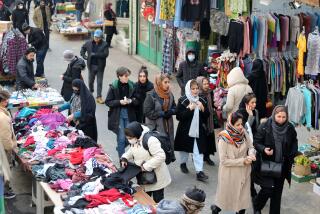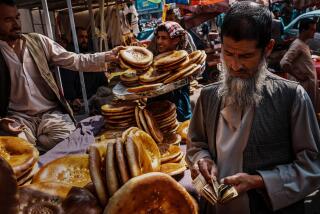Due to Inflation, Iraq to Stop Printing Money
- Share via
BAGHDAD — Iraqi President Saddam Hussein has ordered his government to stop printing money to try to contain runaway inflation, Baghdad newspapers reported Tuesday.
The Iraqi dinar has lost almost 20% of its value against the dollar over the past two weeks while food prices have soared because of the continuing impact of international sanctions imposed on Iraq after its 1990 invasion of Kuwait.
Iraq’s three official newspapers, state radio and television carried the text of Hussein’s address to a Cabinet meeting in which he said drastic measures were needed.
He called for an immediate halt to the printing of money, for belt-tightening measures in state ministries and enterprises, imposition of new taxes and sale of state property.
Baghdad-based diplomats said the new measures indicated that Iraq did not expect the United Nations-imposed sanctions to be eased in 1996 and that Iraq would resist pressure to accept U.N. terms that would allow limited sales of the country’s oil.
The dollar was trading at about 2,900 dinars Tuesday, up from 2,500 in mid-December.
There are no official figures on the amount of money in circulation. The official press reported last year that the government had paid Iraqi farmers a staggering 400 billion dinars for their wheat and barley harvests, which are now being sold at giveaway rates to the public.
Official inflation figures are not available, but a U.N. Food and Agriculture Organization report last year said food prices had skyrocketed by 4,000 to 5,000 times since sanctions began.
Hussein said new taxes and increases in the cost of state services to meet costs involved would withdraw excess dinars from circulation. No details were disclosed.
More to Read
Sign up for Essential California
The most important California stories and recommendations in your inbox every morning.
You may occasionally receive promotional content from the Los Angeles Times.










